Toxicology Major Resources
Here you will find:
- Key information about your major
- How and when to meet with your major advisor
- Planning tools that will help you track your progress in the major
- Ways to explore career opportunities related to the Toxicology major
Take a few moments to look at the information below. It will help you plan effectively and avoid surprises during your studies at John Jay. Please visit the Science Department's website for information, resources, and opportunities!
Toxicology Requirements
Freshmen
To be admitted to the Toxicology (TOX) major as a freshman, you must meet the following criteria:
Out-of-State Freshmen
High School academic average of 81 or higher AND
3 years of HS Math AND
3 years of HS Science AND
Have taken HS Chemistry course
In-State Freshmen
High School academic average of 81 or higher AND
3.5 units of HS Math AND
4 units of HS Science AND
Have taken HS Chemistry Regents OR HS Chemistry course
1. If you meet the above criteria and select Toxicology as your desired major on your admissions application, you will be approved for the TOX major. Your first chemistry and biology courses at John Jay will be determined by your math placement.
2. If you do not meet the above criteria, you will be defaulted to a Criminal Justice BS (CJBS) major, which you could change to another non-science major if you wish. If you still have a strong interest in the TOX major, please contact Dr. Cheng (shcheng@jjay.cuny.edu) for advisement, and consider a biology or chemistry minor. You can achieve admission to the major if you earn at least a 2.5 GPA in your math and biology or chemistry science courses.
3. If you did not apply for the TOX major but are interested in declaring it, at your freshman registration session you must express this interest. An academic advisor will give you a Referral Form to take to the Admissions Office, where they will evaluate your eligibility. If admitted, you will be allowed to register for the appropriate biology and chemistry courses. If not, see the steps above for students who do not currently meet the major's admission criteria.
Continuing Students
If you would like to switch to TOX from another major, consult with Dr. Cheng (shcheng@jjay.cuny.edu) to discuss the feasibility of this switch and learn what you can do to put yourself in the strongest position for admission.
Transfer Students
In order to gain admission to TOX as a transfer student, you must have completed core science courses such as biology, chemistry, physics, algebra, or calculus at another college with a GPA of 2.5 or higher in these courses. If you don’t meet these admissions criteria, consult with Dr. Cheng (shcheng@jjay.cuny.edu) to discuss your options.
You are responsible for the major requirements that were in effect when you declared the major. To confirm the requirements you should be following, go to the Undergraduate Bulletin for that academic year. For example, if you declared the Toxicology major in Fall 2016 or Spring 2017, refer to the 2016-2017 Undergraduate Bulletin. If you declare the major and then leave the College for more than one full semester, you’re responsible for the major requirements in effect when you return, if they have changed.
Below, find the Undergraduate Bulletin that was in effect when you declared the major.
- 2024-2025 Undergraduate Bulletin - Toxicology
- 2023-2024 Undergraduate Bulletin - Toxicology
- 2022-2023 Undergraduate Bulletin - Toxicology
- 2021-2022 Undergraduate Bulletin - Toxicology
- 2020-2021 Undergraduate Bulletin - Toxicology
- 2019-2020 Undergraduate Bulletin - Toxicology
- 2018-2019 Undergraduate Bulletin - Toxicology
- 2017-2018 Undergraduate Bulletin - Toxicology
- 2016-2017 Undergraduate Bulletin - Toxicology
| Below is a list of Toxicology courses that can also meet your general education requirements. Note that a single science course cannot meet both the Life and Physical Science requirement and the Scientific World requirement. You must meet these requirements with two separate courses. | ||
| Math & Quantitative Reasoning | Life & Physical Science | Scientific World |
| MAT 241 | BIO 103 | BIO 103 |
| MAT 301 | BIO 104 | BIO 104 |
| CHE 103 | CHE 103 | |
| CHE 104 | CHE 104 | |
| CHE 201 | CHE 201 | |
| CHE 202 | CHE 202 | |
| PHY 101 | PHY 101 | |
| PHY 102 | PHY 102 |
Major Advising
During Fall 2024, for Toxicology major advising please click on Dr. Cheng's personal availability link (https://jjay-cuny.campus.eab.com/pal/EZBNrFuyH0) to make an advisement appointment or email her at shcheng@jjay.cuny.edu to set up a Zoom appointment.
Major Advisor: Dr. Shu-Yuan Cheng
shcheng@jjay.cuny.edu
5.61.09 NB
Toxicology majors who need advising during Summer session (June 3-August 27) 2024 can click on Dr. Cheng's personal availability link (https://jjay-cuny.campus.eab.com/pal/EZBNrFuyH0) to make an advisement appointment or email her at shcheng@jjay.cuny.edu to set up a Zoom appointment.
Major Advisor: Dr. Shu-Yuan Cheng
shcheng@jjay.cuny.edu
5.61.09 NB (as of July 1, 2024)
Sophomores with 45-59 credits may have a hold placed on their registration. The hold will be removed when they have a major advising appointment with Dr. Shu-Yuan Cheng (shcheng@jjay.cuny.edu). This discussion will encourage wise planning and allow students to ask any questions they may have about the major. How do you know if you have a major hold? Go to CUNYfirst and complete the following steps:
- Check the Holds box of your CUNYfirst Student Center. If "Advisement Required" appears, click on “details.”
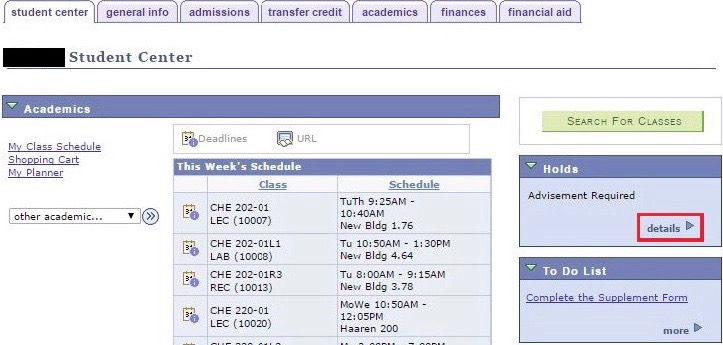
- Click on “Advisement Required.”

- See which type of advisement you need. If you must see a major advisor, then make a major advising appointment following the steps preferred by this department.
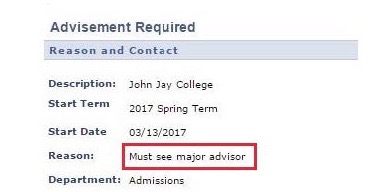
Plan Ahead: Graduate on Time
Remember that you will need at least a 2.0 GPA in the major and at least a 2.0 overall GPA to graduate. The Toxicology major has several courses that build on each other in a sequence, so be sure to be aware of this and plan accordingly.
Math and Physics
You are required to take one semester of calculus (MAT 151) followed by one semester of probability and statistics (MAT 301).

- If you place into MAT 105, you will need to take MAT 105 and then MAT 141 as foundation for MAT 151. It is important to take these math courses as early as possible. If you start with MAT 105 in a fall semester, then take MAT 141 in spring, you can take MAT 151 during summer session to be ready for Physics in the upcoming fall.
- MAT 105 or higher is a prerequisite or co-requisite for certain Biology and Chemistry courses.
- The Toxicology physics requirement should be taken in the sophomore year. You have two options for meeting this requirement. Your first option is to follow the normal Toxicology major sequence of PHY 101-102, in which case you will not need any calculus foundation and may follow the usual math sequence illustrated above. Your second option is to take PHY 203-204, the recommended sequence if you are considering graduate school or professional school in the sciences. If you decide to take PHY 203-204 instead of the normal PHY 101-102 course sequence, you will be required to fulfill slightly different math requirements. You will need to take MAT 151 before PHY 203, and you will need to take MAT 152 and PHY 203 before PHY 204. See the PHY 203-204 course sequence below:
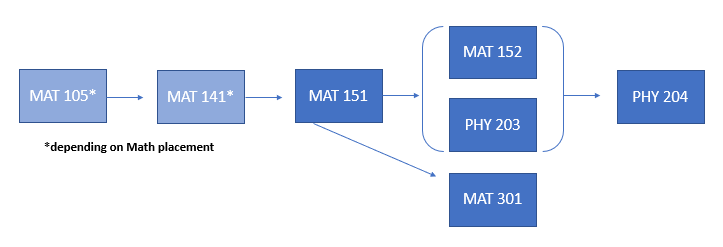
Biology
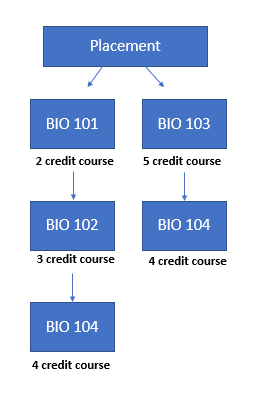
Your placement will be either BIO 101 or BIO 103.
- If you start with BIO 103 (5 credits), you will then take BIO 104.
- If you start with BIO 101 (2 credits), you will then take BIO 102 (3 credits) before taking BIO 104.
The Biology sequence should be completed by the end of freshman year or fall of sophomore year.
Chemistry
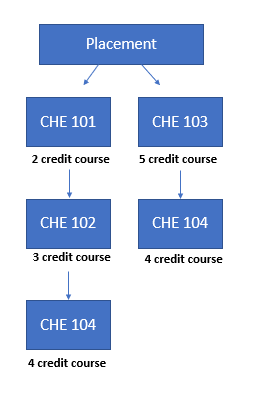
Your placement will be either CHE 101 or CHE 103.
- If you start with CHE 103 (5 credits), you will then take CHE 104.
- If you start with CHE 101 (2 credits), you will then take CHE 102 (3 credits) before taking CHE 104.
Be sure to complete the Chemistry sequence by the end of your freshman year (spring or summer) to prepare for the Organic Chemistry sequence in your sophomore year.
A capstone course is required for the Toxicology degree. You will fulfill this requirement after your junior year with either TOX 401 (Senior Seminar in Toxicology) or with the FOS 402 Research Internship. To learn more about your internship options, please contact the Toxicology major advisor.
Major Advisor: Dr. Shu-Yuan Cheng
Drop-in advisement hours: Mon 10-11:30 am, 5.61.09 NB
To schedule an appointment at another time, please email Dr. Cheng at shcheng@jjay.cuny.edu.
- DegreeWorks degree audit - Use this online planning tool to track your overall progress toward graduation. You will see which of your general education and major requirements are completed, in progress, or still needed. Refer to the DegreeWorks FAQs to better understand how to use this helpful tool. Note: be sure to confirm the accuracy of your degree audit with a general advisor and major advisor.
- Toxicology Advisement Form - Fill out this printable worksheet to keep track of which major requirements you have completed and which ones you still need.
- Sample Four Year Plan - See our Sample Four Year Plan for students who placed into MAT 105 or our Sample Four Year Plan for students who placed into MAT 141 for an example of how you could complete all your degree requirements (major, general education, electives) and graduate in four years! Remember that the plan shows just one possible way to combine your requirements. Transfer students in particular should work with advisors to determine what works best for them.
A General Academic Advisor will confirm what general academic requirements you still need, make suggestions about smart course planning that will help you graduate without delays, discuss your interest in adding a minor or second major, inform you about opportunities such as study abroad, discuss general questions and concerns, and make helpful referrals. Visit the Academic Advisement Center's webpage for more information.
Toxicology and Careers
Undergraduate Toxicology students are strongly encouraged to become Society of Toxicology (SOT) Undergraduate Student Affiliates. There is no fee for application. Undergraduate Student Affiliates will have access to many resources, including:
- The SOT Undergraduate Affiliate ToXchange Community
- SOT Undergraduate awards and special SOT Annual Meetings
- SOT CEd-Tox online courses at no cost
- SOT publications
- Information about summer research programs, internships, careers, events on campus, and academic and postdoctoral education programs.
Listen to Professor Marta Conchero-Guisan talk about how the Toxicology major provides unique hands-on experience in lab courses as well as invaluable research experience to prepare you for a wide range of interesting careers, and how work in this field can actually create greater justice in our world.
The Center for Career and Professional Development is a great resource for all questions related to job searches, internships, and career preparation. CCPD staff are available to meet individually with students and alumni in L72.00 New Building. To request a 45-minute counseling appointment, log on to John Jay Careers Online. 15-minute drop-in sessions are available all day Mon-Fri. Stop by in person earlier the same day to schedule a drop-in session.